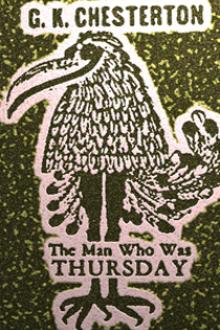The Man Who Was Thursday - G. K. Chesterton (best short books to read .TXT) 📗

- Author: G. K. Chesterton
- Performer: 1586170422
Book online «The Man Who Was Thursday - G. K. Chesterton (best short books to read .TXT) 📗». Author G. K. Chesterton
The man’s name, it seemed, was Gogol; he was a Pole, and in this circle of days he was called Tuesday. His soul and speech were incurably tragic; he could not force himself to play the prosperous and frivolous part demanded of him by President Sunday. And, indeed, when Syme came in the President, with that daring disregard of public suspicion which was his policy, was actually chaffing Gogol upon his inability to assume conventional graces.
“Our friend Tuesday,” said the President in a deep voice at once of quietude and volume, “our friend Tuesday doesn’t seem to grasp the idea. He dresses up like a gentleman, but he seems to be too great a soul to behave like one. He insists on the ways of the stage conspirator. Now if a gentleman goes about London in a top hat and a frock-coat, no one need know that he is an anarchist. But if a gentleman puts on a top hat and a frock-coat, and then goes about on his hands and knees—well, he may attract attention. That’s what Brother Gogol does. He goes about on his hands and knees with such inexhaustible diplomacy, that by this time he finds it quite difficult to walk upright.”
“I am not good at concealment,” said Gogol sulkily, with a thick foreign accent; “I am not ashamed of the cause.”
“Yes you are, my boy, and so is the cause of you,” said the President good-naturedly. “You hide as much as anybody; but you can’t do it, you see, you’re such an ass! You try to combine two inconsistent methods. When a householder finds a man under his bed, he will probably pause to note the circumstance. But if he finds a man under his bed in a top hat, you will agree with me, my dear Tuesday, that he is not likely even to forget it. Now when you were found under Admiral Biffin’s bed—”
“I am not good at deception,” said Tuesday gloomily, flushing.
“Right, my boy, right,” said the President with a ponderous heartiness, “you aren’t good at anything.”
While this stream of conversation continued, Syme was looking more steadily at the men around him. As he did so, he gradually felt all his sense of something spiritually queer return.
He had thought at first that they were all of common stature and costume, with the evident exception of the hairy Gogol. But as he looked at the others, he began to see in each of them exactly what he had seen in the man by the river, a demoniac detail somewhere. That lop-sided laugh, which would suddenly disfigure the fine face of his original guide, was typical of all these types. Each man had something about him, perceived perhaps at the tenth or twentieth glance, which was not normal, and which seemed hardly human. The only metaphor he could think of was this, that they all looked as men of fashion and presence would look, with the additional twist given in a false and curved mirror.
Only the individual examples will express this half-concealed eccentricity. Syme’s original cicerone bore the title of Monday; he was the Secretary of the Council, and his twisted smile was regarded with more terror than anything, except the President’s horrible, happy laughter. But now that Syme had more space and light to observe him, there were other touches. His fine face was so emaciated, that Syme thought it must be wasted with some disease; yet somehow the very distress of his dark eyes denied this. It was no physical ill that troubled him. His eyes were alive with intellectual torture, as if pure thought was pain.
He was typical of each of the tribe; each man was subtly and differently wrong. Next to him sat Tuesday, the tousle-headed Gogol, a man more obviously mad. Next was Wednesday, a certain Marquis de St. Eustache, a sufficiently characteristic figure. The first few glances found nothing unusual about him, except that he was the only man at table who wore the fashionable clothes as if they were really his own. He had a black French beard cut square and a black English frock-coat cut even squarer. But Syme, sensitive to such things, felt somehow that the man carried a rich atmosphere with him, a rich atmosphere that suffocated. It reminded one irrationally of drowsy odours and of dying lamps in the darker poems of Byron and Poe. With this went a sense of his being clad, not in lighter colours, but in softer materials; his black seemed richer and warmer than the black shades about him, as if it were compounded of profound colour. His black coat looked as if it were only black by being too dense a purple. His black beard looked as if it were only black by being too deep a blue. And in the gloom and thickness of the beard his dark red mouth showed sensual and scornful. Whatever he was he was not a Frenchman; he might be a Jew; he might be something deeper yet in the dark heart of the East. In the bright coloured Persian tiles and pictures showing tyrants hunting, you may see just those almond eyes, those blue-black beards, those cruel, crimson lips.
Then came Syme, and next a very old man, Professor de Worms, who still kept the chair of Friday, though every day it was expected that his death would leave it empty. Save for his intellect, he was in the last dissolution of senile decay. His face was as grey as his long grey beard, his forehead was lifted and fixed finally in a furrow of mild despair. In no other case, not even that of Gogol, did the bridegroom brilliancy of the morning dress express a more painful contrast. For the red flower in his button-hole showed up against a face that was literally discoloured like lead; the whole hideous effect was as if some drunken dandies had put their clothes upon a corpse. When he rose or sat down, which was with long labour and peril, something worse was expressed than mere weakness, something indefinably connected with the horror of the whole scene. It did not express decrepitude merely, but corruption. Another hateful fancy crossed Syme’s quivering mind. He could not help thinking that whenever the man moved a leg or arm might fall off.
Right at the end sat the man called Saturday, the simplest and the most baffling of all. He was a short, square man with a dark, square face clean-shaven, a medical practitioner going by the name of Bull. He had that combination of savoir-faire with a sort of well-groomed coarseness which is not uncommon in young doctors. He carried his fine clothes with confidence rather than ease, and he mostly wore a set smile. There was nothing whatever odd about him, except that he wore a pair of dark, almost opaque spectacles. It may have been merely a crescendo of nervous fancy that had gone before, but those black discs were dreadful to Syme; they reminded him of half-remembered ugly tales, of some story about pennies being put on the eyes of the dead. Syme’s eye always caught the black glasses and the blind grin. Had the dying Professor worn them, or even the pale Secretary, they would have been appropriate. But on the younger and grosser man they seemed only an enigma. They took away the key of the face. You could not tell what his smile or his gravity meant. Partly from this, and partly because he had a vulgar virility wanting in most of the others it seemed to Syme that he might be the wickedest of all those wicked men. Syme even had the thought that his eyes might be covered up because they were too frightful to see.
CHAPTER VI. THE EXPOSURE
SUCH were the six men who had sworn to destroy the world. Again and again Syme strove to pull together his common sense in their presence. Sometimes he saw for an instant that these notions were subjective, that he was only looking at ordinary men, one of whom was old, another nervous, another short-sighted. The sense of an unnatural symbolism always settled back on him again. Each figure seemed to be, somehow, on the borderland of things, just as their theory was on the borderland of thought. He knew that each one of these men stood at the extreme end, so to speak, of some wild road of reasoning. He could only fancy, as in some old-world fable, that if a man went westward to the end of the world he would find something—say a tree—that was more or less than a tree, a tree possessed by a spirit; and that if he went east to the end of the world he would find something else that was not wholly itself—a tower, perhaps, of which the very shape was wicked. So these figures seemed to stand up, violent and unaccountable, against an ultimate horizon, visions from the verge. The ends of the earth were closing in.
Talk had been going on steadily as he took in the scene; and not the least of the contrasts of that bewildering breakfast-table was the contrast between the easy and unobtrusive tone of talk and its terrible purport. They were deep in the discussion of an actual and immediate plot. The waiter downstairs had spoken quite correctly when he said that they were talking about bombs and kings. Only three days afterwards the Czar was to meet the President of the French Republic in Paris, and over their bacon and eggs upon their sunny balcony these beaming gentlemen had decided how both should die. Even the instrument was chosen; the black-bearded Marquis, it appeared, was to carry the bomb.
Ordinarily speaking, the proximity of this positive and objective crime would have sobered Syme, and cured him of all his merely mystical tremors. He would have thought of nothing but the need of saving at least two human bodies from being ripped in pieces with iron and roaring gas. But the truth was that by this time he had begun to feel a third kind of fear, more piercing and practical than either his moral revulsion or his social responsibility. Very simply, he had no fear to spare for the French President or the Czar; he had begun to fear for himself. Most of the talkers took little heed of him, debating now with their faces closer together, and almost uniformly grave, save when for an instant the smile of the Secretary ran aslant across his face as the jagged lightning runs aslant across the sky. But there was one persistent thing which first troubled Syme and at last terrified him. The President was always looking at him, steadily, and with a great and baffling interest. The enormous man was quite quiet, but his blue eyes stood out of his head. And they were always fixed on Syme.
Syme felt moved to spring up and leap over the balcony. When the President’s eyes were on him he felt as if he were made of glass. He had hardly the shred of a doubt that in some silent and extraordinary way Sunday had found out that he





Comments (0)